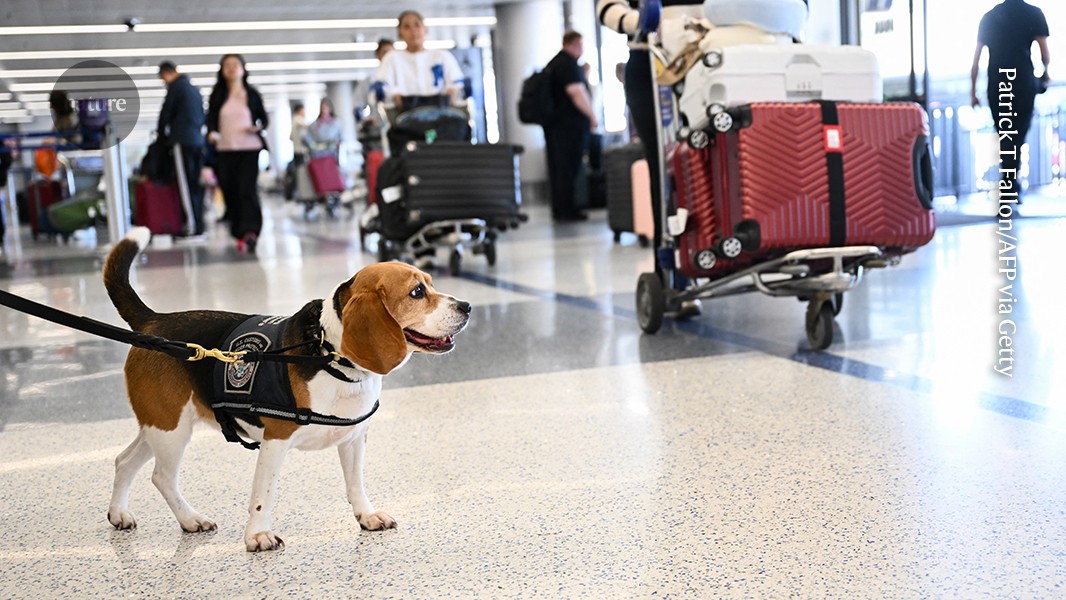Arrests of scientists over smuggled samples add to US border anxiety

Nature talks to legal and other specialists about the cases and what to watch out for when transporting lab materials
After being charged last month with trying to smuggle frog embryos into the United States, Kseniia Petrova, a Russian bioinformatician, was indicted on 25 June on additional charges by a grand jury in Boston, Massachusetts — including making a false statement to customs agents. Petrova is one of at least four foreign scientists facing criminal charges for attempting to bring biological material into the country, adding to the anxiety rippling through the research community as the administration of US President Donald Trump slashes science spending and cracks down on immigration.
Nature talked to research and legal specialists to understand whether these cases cropping up is unusual and how lab materials should be transported. Detentions for carrying undocumented biological material into the United States happen every year, says Jonathan Grode, an attorney at the immigration law firm Green and Spiegel in Philadelphia, Pennsylvania, who is not involved in any of the cases.
Typically, if a person enters the country with a non-hazardous item that is either prohibited or lacks the proper documentation, the authorities confiscate the item, inform the individual of the proper procedure to retrieve it and issue a fine for failing to follow protocol, Grode says. If something is considered hazardous, that changes the calculus, as does being a repeat offender. If you’re both of those things “you are going to get arrested, you are going to be fined and you are going to be denied entry to the country”, he adds.
“The rules have not changed” under the Trump administration, Grode says. What has is the “sensationalism” around any foreigner who has problems at the border, whether from the media or from the Trump team highlighting the case in its deportation efforts, he adds.
Customs violations
Petrova, who had been working at Harvard Medical School in Boston, Massachusetts, was arrested in February for allegedly failing to declare the embryos when transporting them to Harvard from France. At a hearing on 18 June, Brian Goldsworthy, an agent for the US Department of Homeland Security, testified that border agents at Boston’s Logan International Airport asked Petrova whether she had food in her bag and she said no — but she was actually carrying a foam box containing the embryos.
Petrova’s immigration attorney, Gregory Romanowsky, contends that border agents broke protocol, because the alleged customs violation should have triggered a civil process rather than a criminal one. Instead, agents treated the issue as an immigration violation, revoked Petrova’s visa and started deportation proceedings, he says. She spent 116 days in detention before her release from federal custody on bail on 12 June.

Kseniia Petrova was released on bail from federal custody on 12 June.Credit: Leah Willingham/AP Photo/Alamy
Petrova might be able to avoid some of the criminal charges, because there are questions about whether the embryos were hazardous, Grode says, but her mistake was not to tell the authorities about the embryos in the first place. “That is the number-one way you can find yourself in trouble,” he says.
In another case, the US Federal Bureau of Investigation (FBI) arrested Yunqing Jian, a Chinese postdoctoral fellow at the University of Michigan in Ann Arbor, earlier this month. According to court documents, in July last year, her partner, Zunyong Liu, a researcher at Zhejiang University in China, tried to bring samples of a fungus known as Fusarium graminearum, which can harm cereal crops such as wheat, into the United States. He initially denied carrying the fungus in his backpack, the documents say, but then admitted he was taking it to Jian’s university, where he said he planned to study it during his visit. Following an investigation by the FBI, both plant pathologists have been charged with conspiracy, smuggling and making false statements, and Liu has also been charged with visa fraud. Jian remains in custody in Detroit, Michigan.
According to a criminal complaint filed by FBI agent Edward Nieh on 2 June, phone records show that this wasn’t the first time Jian and Liu had smuggled biological materials into the United States.
On 8 June, another Chinese scientist, Chengxuan Han, was arrested at Detroit Metropolitan Airport. Han, a biologist at Huazhong University of Science and Technology in Wuhan, was planning to spend a year conducting research at the University of Michigan, according to a criminal complaint filed as part of the case. The authorities detained her and charged her, alleging that she had, on four occasions, sent staff members at the University of Michigan “concealed biological materials” that were “related to round worms”, according to a press release issued by the US Attorney’s Office for the Eastern District of Michigan.
A Department of Homeland Security spokesperson told Nature that parasitic roundworms can cause significant damage to crops, leading to economic hardship for farmers. The criminal complaint filed with the case doesn’t mention parasitic roundworms — only Caenorhabditis elegans, a type of roundworm frequently used in the laboratory as a model organism.
The hazardousness of the materials that the scientists sent will need to be assessed in each case, as will the scientists’ intent in using the materials, but their lack of transparency will make their cases more difficult, Grode says. “It’s not so much what was being sent, but the effort to conceal what was being sent,” he says.
Login or create a free account to read this content
Gain free access to this article, as well as selected content from this journal and more on nature.com
or
Sign in or create an accountdoi: https://doi.org/10.1038/d41586-025-01958-4
This story originally appeared on: Nature - Author:Humberto Basilio


















